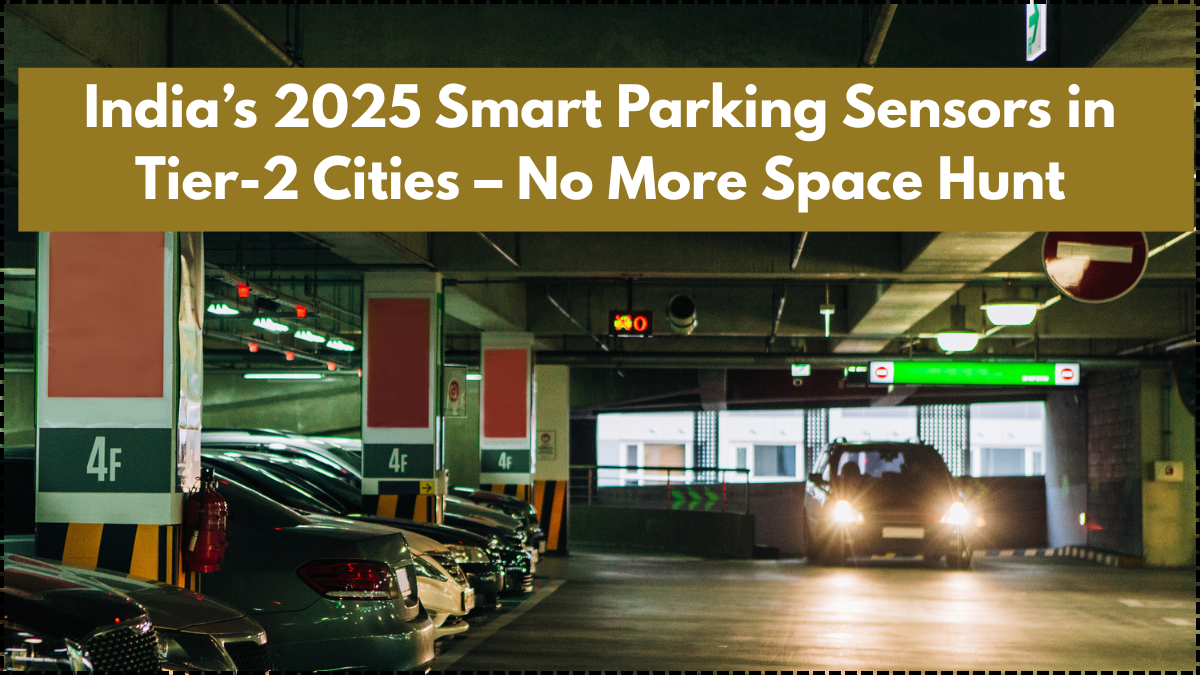Finding a parking spot in busy city centers can be frustrating and time-consuming. To tackle this growing problem, the government has launched Smart Parking Sensors 2025 as part of its India urban parking tech initiative. This program aims to transform parking management in Tier-2 cities, where vehicle numbers are rising but infrastructure has yet to fully catch up. By using sensor-based technology, the initiative promises to cut down parking search time, reduce traffic congestion, and improve the overall urban driving experience.

How Smart Parking Sensors 2025 Work
The Smart Parking Sensors 2025 system uses IoT-enabled sensors installed in parking spots to detect whether a space is occupied or available. These sensors transmit real-time data to a central server, which updates availability information on the India urban parking tech mobile application and digital boards near parking zones.
Motorists can check available parking spots before arriving, making it easier to plan their trips and avoid unnecessary driving around congested areas. The sensors are designed to work in all weather conditions and are low-maintenance, ensuring long-term reliability for urban management authorities.
Key features include:
-
Real-time occupancy updates
-
Integration with parking payment systems
-
Digital navigation to nearest available spot
-
Data analytics for parking demand forecasting
Benefits for Drivers, Businesses, and City Authorities
The Smart Parking Sensors 2025 project combined with India urban parking tech provides advantages across multiple levels.
For Drivers:
-
Reduced time spent looking for parking
-
Lower fuel consumption and emissions
-
Increased convenience through app-based navigation
For Businesses:
-
Improved customer access due to better parking availability
-
More predictable traffic flow near commercial areas
-
Enhanced visitor satisfaction
For Authorities:
-
Better data for infrastructure planning
-
Increased parking revenue through efficient management
-
Reduced roadside congestion and illegal parking
Traditional Parking vs Smart Parking Sensors 2025
| Aspect | Traditional Parking | Smart Parking Sensors 2025 |
|---|---|---|
| Time to find parking | High | Low |
| Fuel wastage | Significant | Minimal |
| Traffic congestion | Increased due to circling vehicles | Reduced |
| Availability updates | None | Real-time |
| Payment integration | Manual | Digital and automated |
| Data for city planning | Limited | Comprehensive |
Implementation Across Tier-2 Cities
The India urban parking tech initiative is rolling out Smart Parking Sensors 2025 in cities such as Indore, Bhopal, Nagpur, Jaipur, and Coimbatore. These cities were chosen due to their rapid urban growth and increasing vehicle density.
Implementation steps include:
-
Installing IoT-enabled sensors in both on-street and off-street parking areas
-
Integrating sensors with mobile apps for public use
-
Setting up digital boards at key traffic points to guide drivers
-
Training municipal staff to maintain and operate the systems
In addition, the program includes partnerships with local businesses and shopping centers to extend the coverage of smart parking facilities beyond municipal lots, creating a network of interconnected parking solutions.
Conclusion
By launching Smart Parking Sensors 2025 under the India urban parking tech framework, the government is addressing one of the most common urban driving frustrations. This initiative will not only save time and fuel for drivers but also help reduce pollution, congestion, and operational inefficiencies in parking management. Tier-2 cities, often overlooked in tech adoption, are now at the forefront of India’s smart mobility transformation.
FAQs
How do drivers use the Smart Parking Sensors 2025 system?
Drivers can check real-time parking availability through the India urban parking tech mobile app or view information on digital boards near parking areas.
Are the sensors weather-proof?
Yes, the sensors in Smart Parking Sensors 2025 are designed to function in all weather conditions, including rain and extreme heat.
Will this system be introduced in Tier-1 cities as well?
While the initial rollout targets Tier-2 cities, the India urban parking tech program aims to expand to Tier-1 cities based on results.
Can parking payments be made through the app?
Yes, the mobile app allows users to reserve and pay for parking digitally, integrating seamlessly with Smart Parking Sensors 2025.
Click here to learn more